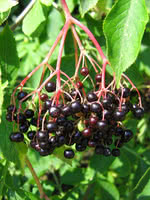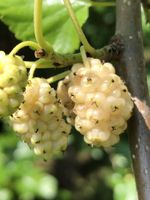Mon-Fri 9am - 5pm Mountain time
Black Elderberry vs Russian White Mulberry
Sambucus canadensis
Morus alba tatarica
NOT AVAILABLE THIS SEASON - MIGHT RETURN
NOT AVAILABLE THIS SEASON - MIGHT RETURN
Black Elderberry is a deciduous shrub native to eastern North America. You can plant this shrub in moist areas and it will help stabilize your soil. You can also use it on rural properties anywhere you'd use a lilac.
Black Elderberries are considered to be partially self-pollinating. So while they will still produce some berries without cross-pollination, planting with another variety will increase yields. Consider planting with Ranch Elderberry or Bob Gordon Elderberry.
Warning: the seeds, stems, leaves, roots, and uncooked berries of the Black Elderberry are poisonous to humans when eaten in quantity. You should cook the berries to make them safe for human consumption.
Russian White Mulberry is a cold hardy and adaptable tree. It is a great choice for the impatient gardener as it reaches its mature height in a short period of time and has an attractive, dense, and rounded form.
Odd looking berries are produced among a backdrop of glossy, deep green foliage. The blackberry-esque berries ripen slowly over the season, ranging in color from white, pink, and purple-violet. While the berries are not well regarded for fresh eating, they have made tasty jams and preserves.
Black Elderberry Quick Facts
Russian White Mulberry Quick Facts
Toxicity: leaves, stems, and uncooked berries are poisonous to humans

